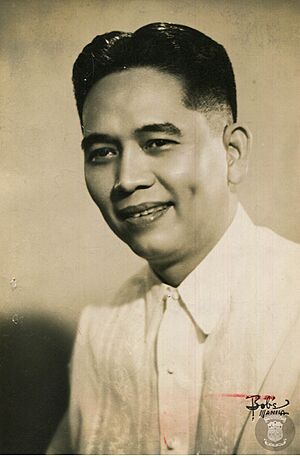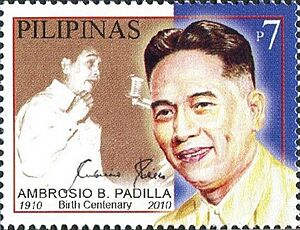Ambrosio Padilla facts for kids
Quick facts for kids
Ambrosio B. Padilla
|
||||||||||||||||||||
|---|---|---|---|---|---|---|---|---|---|---|---|---|---|---|---|---|---|---|---|---|
 |
||||||||||||||||||||
| Senate Minority Leader | ||||||||||||||||||||
| In office January 17, 1966 – December 30, 1969 |
||||||||||||||||||||
| Preceded by | Estanislao Fernandez | |||||||||||||||||||
| Succeeded by | Gerardo Roxas | |||||||||||||||||||
| In office January 27, 1958 – January 25, 1960 |
||||||||||||||||||||
| Preceded by | Lorenzo M. Tañada Sr. | |||||||||||||||||||
| Succeeded by | Ferdinand Marcos | |||||||||||||||||||
| Senator of the Philippines | ||||||||||||||||||||
| In office December 30, 1957 – September 23, 1972 |
||||||||||||||||||||
| Solicitor General of the Philippines | ||||||||||||||||||||
| In office September 1, 1954 – December 30, 1957 |
||||||||||||||||||||
| President | Ramon Magsaysay | |||||||||||||||||||
| Preceded by | Querube Makalintal | |||||||||||||||||||
| Succeeded by | Guillermo Torres | |||||||||||||||||||
| 1st President of the Philippine Olympic Committee | ||||||||||||||||||||
| In office 1975–1976 |
||||||||||||||||||||
| Preceded by | Himself (as President of the Philippine Amateur Athletic Federation) | |||||||||||||||||||
| Succeeded by | Nereo Andolong | |||||||||||||||||||
| 6th President of the Philippine Amateur Athletic Federation | ||||||||||||||||||||
| In office 1970–1975 |
||||||||||||||||||||
| Preceded by | Felipe Monserrat | |||||||||||||||||||
| Succeeded by | Himself (as President of the Philippine Olympic Committee) | |||||||||||||||||||
| Vice President of the 1986 Constitutional Commission | ||||||||||||||||||||
| In office June 2, 1986 – October 15, 1986 |
||||||||||||||||||||
| President | Cecilia Muñoz-Palma | |||||||||||||||||||
| Personal details | ||||||||||||||||||||
| Born |
Ambrosio Bibby Padilla
December 7, 1910 Lingayen, Pangasinan, Philippine Islands |
|||||||||||||||||||
| Died | August 11, 1996 (aged 85) Quezon City, Philippines |
|||||||||||||||||||
| Nationality | Filipino | |||||||||||||||||||
| Political party | Liberal | |||||||||||||||||||
| Spouse | Lourdes de las Alas | |||||||||||||||||||
| Children | 10 | |||||||||||||||||||
| Alma mater | Ateneo de Manila University of the Philippines Diliman (LL.B) |
|||||||||||||||||||
|
||||||||||||||||||||
Ambrosio Bibby Padilla (Tagalog: [paˈdilja]; December 7, 1910 – August 11, 1996) was a famous Filipino basketball player and a respected politician. He became a member of the Senate of the Philippines. He played a very important role in developing basketball across Asia.
Contents
Early Life and Family
Ambrosio Padilla was born on December 7, 1910. He was the eighth of eleven children. His parents were Dr. Nicanor Padilla and Ysabel Bibby. On May 4, 1941, he married Lourdes de las Alas. She was the eldest daughter of Senator Antonio de las Alas. Ambrosio and Lourdes had 10 children together.
Amazing Athletic Career
Ambrosio Padilla grew up in Lingayen, Pangasinan. He went to Ateneo de Manila for high school and college. In college, he was the team captain of the Ateneo Blue Eagles basketball team. They won the 1928 NCAA (Philippines) championship. Later, he studied law at the University of the Philippines. He also played baseball for the university team.
Playing for the Philippines
In 1930, Padilla played for the Philippine national basketball team. They won the gold medal at the 9th Far Eastern Championship Games in Tokyo, Japan. He played with other great players like Jacinto Ciria Cruz. In 1934, he was the team captain again. The team won the basketball championship at the 10th Far Eastern Games held in the Philippines.
In 1936, Padilla led the national basketball team as captain. They finished fifth at the 11th Summer Olympics in Berlin, Germany. This is still the best finish for an Asian country in men's Olympic basketball history. The team had strong players like Charles Borck.
Leading in Sports Administration
After his playing career, Padilla became a leader in sports. From 1938 to 1954, he chaired the Philippine Amateur Athletic Federation (PAAF) Basketball Committee. This group managed amateur sports in the Philippines.
The international basketball group, FIBA, made him its Vice President for Asia. This was from 1956 to 1964. He helped create the Asian Basketball Confederation (ABC). This is now known as FIBA Asia. He was elected its first President from 1960 to 1966. His former coach, Dionisio Calvo, was the Secretary-General. After his term, he continued to serve as ABC president emeritus.
In 1970, he became the sixth President of the PAAF. This organization later changed its name to the Philippine Olympic Committee (POC) in 1975. Padilla became the first president of the POC.
Important Political Career
In 1954, President Ramon Magsaysay appointed Padilla as the Solicitor General. This means he was a top lawyer for the government. He later left this job in 1957 to run for the Senate. He won the election and served as a Senator until 1972.
In 1972, President Ferdinand Marcos declared Martial Law. This meant the government had special powers. Padilla strongly disagreed with Martial Law. He used his legal skills to fight for freedom and human rights. He bravely stood up against the government during this difficult time.
After President Marcos was removed from power in 1986, President Corazon Aquino asked Padilla to join the Philippine Constitutional Commission of 1986. This group was tasked with writing a new constitution for the country. Padilla was elected vice-chair of the commission. The new Constitution was approved by the Filipino people on February 2, 1987.
Lasting Legacy
Ambrosio Padilla passed away on August 11, 1996. In January 1999, he was honored by being inducted into the Philippine National Basketball Hall of Fame. Other famous Filipino basketball players were also inducted with him.
The Ateneo de Manila University has an award named after him. The Ambrosio Padilla Award is given every year. It recognizes the best college athlete who also does well in academics. A classroom at Malcolm Hall, which is part of the University of the Philippines College of Law, is also named in his honor.
Awards and Achievements
- 1928 NCAA Philippines champions
- 1930 Far Eastern Games champion
- 1934 Far Eastern Games champions
- 1936 Summer Olympics, fifth place
- Philippine National Hall of Fame (1999)
See Also
- Philippine Constitutional Commission of 1986
 | Sharif Bey |
 | Hale Woodruff |
 | Richmond Barthé |
 | Purvis Young |


